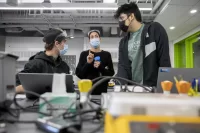
Bates College plans to add eight new permanent faculty positions over the next three years, Vice President for Academic Affairs and Dean of the Faculty Malcolm Hill has announced.
The new tenure-track positions are in addition to seven endowed professorships funded as part of the college’s recently completed Bates Campaign. The result is a nearly 10 percent increase in the Bates faculty under the leadership of Clayton Spencer, who became president of Bates in July 2012.
Expanding the faculty “is a matter of central importance to the strength and vitality of our academic program,” said Hill, who shared the plan during the January meeting of the Bates faculty.
He added, “Bates has long been known for its strong academic program, anchored by a faculty of outstanding teachers and scholars who work intensively with students to help them acquire the knowledge, skills, and habits of mind that will equip them to be highly effective leaders and contributors in their lives after Bates.”
The eight new positions will “help to reduce workload associated with advising and senior thesis; enhance the student experience with smaller class sizes and expanded curricular offerings; and create opportunities for curricular innovation.”
Vice President for Academic Affairs and Dean of the Faculty Malcolm Hill
Several factors have made the goal of growing the faculty feasible, Hill explained, including recent shifts in the composition of the faculty and retirements of senior members of the faculty; prudent financial planning; and the success of the Bates Campaign, which raised $346 million, of which $90 million was given to drive academic excellence.
In his remarks to the faculty at its Jan. 17 meeting Hill noted that the plan to expand the faculty will be pressure-tested against current economic conditions. “Our ability to fully achieve this goal is contingent upon maintaining a stable and positive financial outlook at the college.”

An expanded faculty will deliver significant benefits to Bates and to our students, “maintaining our position as a leading liberal arts college,” said Hill.
The new positions will “help to reduce workload associated with advising and senior thesis; enhance the student experience with smaller class sizes and expanded curricular offerings; and create opportunities for curricular innovation.”
Hill said that that he looks forward to working with the faculty’s Academic Affairs Council to determine the allocation of new faculty positions in existing Bates departments and programs, with an eye on delivering the greatest impact for Bates students and faculty. The plan to expand the faculty will begin with three additive searches in the next academic year (2023–24).
Tenure-track Bates faculty who join the college today and in the coming years will encounter a robust and forward-looking program of professional support, expectations, and mentoring.
In 2021, the faculty adopted new criteria for reappointment, tenure, and promotion through a revision of the Faculty Handbook. In 2022, Bates opened its Center for Inclusive Teaching and Learning to support faculty and staff educators through ongoing professional development in evidence-based and inclusive pedagogies, “which, in turn, will support greater student success,” said Hill.
“Going forward, Bates will continue to invest time and energy to support the faculty in their work, with the ultimate goal of strengthening our ability to deliver an exceptional education for our students.”




